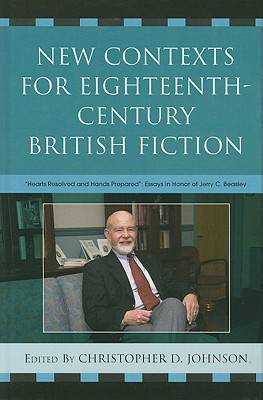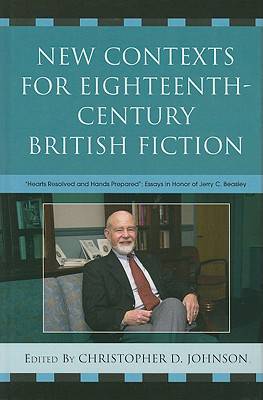
- Afhalen na 1 uur in een winkel met voorraad
- Gratis thuislevering in België vanaf € 30
- Ruim aanbod met 7 miljoen producten
- Afhalen na 1 uur in een winkel met voorraad
- Gratis thuislevering in België vanaf € 30
- Ruim aanbod met 7 miljoen producten
Zoeken
New Contexts for Eighteenth-Century British Fiction
'Hearts Resolved and Hands Prepared'
Christopher D Johnson
Hardcover | Engels
€ 175,95
+ 351 punten
Omschrijving
New Contexts for Eighteenth-Century British Fiction is a collection of thirteen essays honoring Professor Jerry C. Beasley, who retired from the University of Delaware in 2005. The essays, written by friends, collaborators and former students, reflect the scholarly interests that defined Professor Beasley's career and point to new directions of critical inquiry. The initial essays, which discuss Tobias Smollett, Elizabeth Singer Rowe, and Samuel Richardson, suggest new directions in biographical writing, including the intriguing discourse of "life writing" explored by Paula Backscheider. Subsequent essays enrich understandings of eighteenth-century fiction by examining lesser-known works by Jane Barker, Eliza Haywood, and Charlotte Lennox. Many of the essays, especially those that focus on Smollett, use political pamphlets, material artifacts, and urban legends to place familiar novels in new contexts. The collection's final essay demonstrates the vital importance of bibliographic study.
Specificaties
Betrokkenen
- Auteur(s):
- Uitgeverij:
Inhoud
- Aantal bladzijden:
- 384
- Taal:
- Engels
Eigenschappen
- Productcode (EAN):
- 9781611490404
- Verschijningsdatum:
- 18/04/2011
- Uitvoering:
- Hardcover
- Formaat:
- Ongenaaid / garenloos gebonden
- Afmetingen:
- 150 mm x 231 mm
- Gewicht:
- 725 g

Alleen bij Standaard Boekhandel
+ 351 punten op je klantenkaart van Standaard Boekhandel
Beoordelingen
We publiceren alleen reviews die voldoen aan de voorwaarden voor reviews. Bekijk onze voorwaarden voor reviews.











